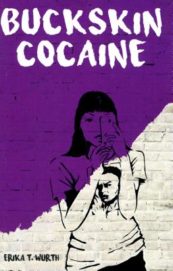 Erika T. Wurth
Erika T. Wurth
Astrophil Press ($15.95)
by Zack Kopp
Erika T. Wurth’s new collection of short stories depicts the Native film industry in the voices of several participants. With nodes in Albuquerque, Denver, and elsewhere throughout the United States, that scene is fraught by all the same vanity games and decadence as its decrepit parent, Hollywood, and seems more prettily horrible by comparison for its smallness of scale. The stories in Buckskin Cocaine are narrated by members of different tribes, including Choctaw, Cree, and Navajo. They are connected but not contiguous, affording a panoramic view of the whole verdant snakepit of it.
In the opening story, “Barry Four Voices,” readers are introduced to the eponymous narrator via a litany of reasons for his being who and what he is, from “Because I’m famous because I’m rich because I grew up poor on a reservation and that’s what no one understands even though I have been telling the same story, over and over for years, to anyone who would listen,” to “Because I know how to fake it. Because there is a way I’m not faking it. Because I do love my life my wife my children and that’s what makes me a good person. I’m happy. Because I’m very happy.” The thing about Barry Four Voices is that his continued existence is an ongoing system of checks and balances enacted by tiny men, some with knives constantly held to his throat to prevent the unthinkable:
What the littlest man doesn’t seem to remember is that he was the one in control when I was a baby, doesn’t he remember how weak we were back then? . . . that’s when the men I was born with first came out, they taught me so much but I still wonder if the littlest man will get out because sometimes I can feel him staring at something I want to love through my eyes and I think God, no, I’m very happy.
The collection proceeds with the story of director George Bull’s attendance of a bustling party with sex and drugs and making new deals on his mind—“I could see Gary was fucked up already, hovering around the bar and babbling like a newborn . . . spilling bourbon all over the dingy, grey-carpeted floor, some big-eyed billyganna broad with ten pounds of shitty turquoise around her skinny neck nodding like mad”—and the story of Lucy Bigboca, a blabbery starlet or groupie who provides a clever juxtaposition to the impressionism of Barry Four Voices and George Bull’s resourceful crudity with open-hearted streams like the following:
I’m not the only one who got pregnant with him either. And I remember I didn’t even tell him, because I was scared it would push him away. So I you know like, took care of it? . . . I need to go out and MAKE IMPORTANT CONNECTIONS and that’s expensive. That’s not MY FAULT. . . . At least I didn’t get stuck with his baby, especially after I found out he was telling lots of girls he was their boyfriend.
Lucy must reconcile abortion with her repeatedly professed adherence to TRADITIONAL Navajo verities. But how all-caps traditional is she? Maybe really a “pretend-ian”? Perhaps an amalgam of both, so scrambled has social belonging become in this joint, where we have to learn to train our eyes to see correctly again. Another character named Robert Two Stories is from Oklahoma, and he says,
George and I just get crazy when we’re together, though the whole industry is crazy really. It’s not our faults. I mean, when you’re at a party and Tom Cruise shows up and like, everyone’s doing coke and you’re surrounded by all of these thin, hot white chicks drunk as shit, I mean . . . I always feel like my head is the camera, and we’ve, like, decided on a really shallow Depth of Field and everything around me is out of focus except for what’s right in front of me.
I’ll leave some of your questions unanswered, but Buckskin Cocaine closes, thoughtfully and precisely, with a beautifully crafted sectioned narration of the relationship between its titular namesake, Native ballerina Olivia James, and her man-piece, non-Native ballerino David. The story follows their adventures around the world and back until he drops her off in Denver, where Olivia must contend with the brashly seductive Tomẚs after meeting him at a high school reunion party. He breaks down the would-be impenetrable fortress Olivia’s built in her mind against teasing and telephonic pestering, with her father asleep on the couch in the next room with blankets around his neck, blissfully unaware of any fateful injustices to come. “I walked across the parking lot, holding my insides as tightly as I could. . . . I was walking towards the sun as it set, towards the west, and as I walked, I was bathed in the dying light, and it covered me like my daddy’s old Pendleton, and I didn’t look back, in fact I didn’t even think to.”
Due to consensus bias, minority authors are liable to develop a crab-eat-crab mentality, vying for the tiny bit of spotlight afforded them by the mainstream. In a recent interview in Word Literature Today, Sherman Alexie made statements about the dearth of Native writers, perhaps protecting his own reputation as top dog. “[Alexie] is a magical writer,” Wurth wrote in a piece for Roar magazine, “and . . . with all issues intact, is more than likely far more a force for good in the world than bad. But remember that the rest of us are here too, writing away, in our own ways.” With Buckskin Cocaine and her other works, Erika T. Wurth is actively un-tokenizing Native lit and reintegrating it with the established canon, opening lush, verdant worlds with her desert-hot words.
